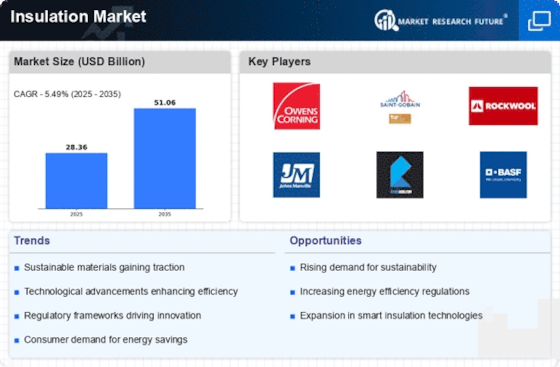Top Industry Leaders in the Insulation Market

This growth is fueled by a multifaceted convergence of factors – rising energy costs, stringent energy efficiency regulations, and increasing awareness of sustainability, all pushing the demand for effective thermal insulation solutions. But navigating this competitive landscape requires a close look at the strategies, players, and recent developments shaping the market.
Market Champions and Their Winning Plays:
Several established giants like Owens Corning, Knauf Insulation, Saint-Gobain, Rockwool International, and Dow Chemical Company dominate the market, each employing specific strategies to gain an edge:
-
Product Diversification: Beyond traditional materials like fiberglass and rockwool, players are expanding their offerings to include specialized solutions like spray foams, vacuum insulation panels, and aerogels for niche applications. Owens Corning, for instance, offers a range of advanced insulation products for high-performance buildings. -
Regional Expansion: Emerging markets in Asia-Pacific, Latin America, and Eastern Europe present immense growth potential. Established players are setting up production facilities and distribution channels in these regions to capitalize on this burgeoning demand. Saint-Gobain, for example, has a strong presence in China and India. -
Sustainability Focus: Eco-friendly insulation materials derived from recycled content or renewable resources are gaining traction. Rockwool International utilizes recycled stone wool in its products, while Dow Chemical Company offers bio-based polyisocyanate foams. -
Technological Innovation: Continuous R&D efforts are focused on developing innovative insulation materials with enhanced thermal performance, improved fire resistance, and acoustic insulation properties. Knauf Insulation has launched a new line of high-performance, thin-film insulation for walls and roofs. -
Strategic Partnerships and Acquisitions: Collaborations with research institutions, universities, and construction companies foster innovation and facilitate access to new technologies and markets. Acquisitions of smaller companies with specialized expertise also help consolidate market share. Owens Corning recently acquired a leading manufacturer of spray foam insulation.
The Pillars of Market Share:
Beyond brand recognition, several factors determine a company's success in the insulation market:
-
Product Performance: Superior thermal resistance, ease of installation, and durability are crucial for customer satisfaction and brand loyalty. -
Price and Cost Competitiveness: Offering competitive pricing while maintaining quality is essential, especially in cost-sensitive segments like residential construction. -
Technical Expertise and Support: Providing comprehensive technical guidance and application know-how helps customers choose the right insulation solution for their specific needs. -
Sustainability and Environmental Footprint: Growing environmental awareness necessitates the development and promotion of eco-friendly materials and sustainable production processes. -
Compliance with Regulations: Navigating the complex web of regulations governing insulation materials in different regions is crucial for market compliance.
Key Players:
-
GAF Materials Corporation
-
Huntsman International LLC
-
Johns Manville
-
Cellofoam North America, Inc.
-
Rockwool International A/S
-
DuPont
-
Owens Corning
-
Atlas Roofing Corporation
-
Saint-Gobain S.A.
-
Kingspan Group
-
BASF
Recent Developments
December 2023: Dow Chemical Company unveils a new line of vacuum insulation panels with exceptional thermal performance, targeting applications in cold storage and refrigerated transport.
November 2023: Knauf Insulation introduces a novel insulation board made from 100% recycled plastic bottles, contributing to circular economy practices in the construction industry.
September 2023: A consortium of major insulation manufacturers launches a research project to explore the potential of bio-based insulation materials made from agricultural waste.
August 2023: Rockwool International expands its production capacity in North America to meet the growing demand for sustainable insulation solutions in the region.










